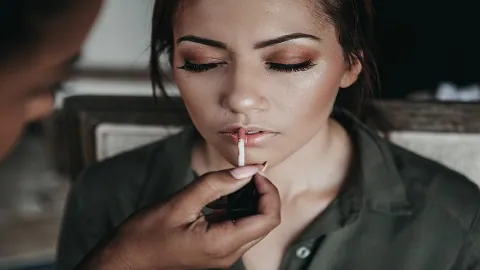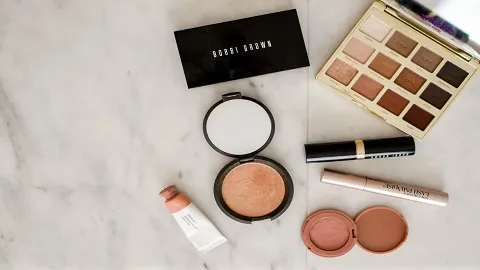Makeup Artist
A makeup artist is a creative expert who uses cosmetics to enhance a person's appearance. They're like magicians with brushes and palettes! Their job is to make you look your best for various occasions - be it a wedding, a photoshoot, a film, or just a fun night out.
They've got a knack for choosing the right shades, understanding face shapes, and highlighting your best features. It's not just about applying makeup; it's about bringing out the inner confidence of every client they work with.
- Introduction
- Typical Job Responsibilities
- Standard Work Environment
- Suggested Work Experience
- Recommended Qualifications
- Projected Career Map
- Beneficial Professional Development
- Learn More
- Conclusion
The job of a makeup artist goes beyond simply making people look great. They work closely with clients to understand the look they want, choose the right makeup products, and apply makeup to achieve the desired effects. Makeup artists excel in creating various styles, from natural to dramatic, ensuring that the makeup they apply complements the client's features, along with their clothing and the setting they’re in. From once-in-a-lifetime wedding makeup to all-out glamour shoots to simply helping clients choose better products for everyday use, the well-versed makeup artists does it all.
Makeup Artist
A makeup artist is a creative expert who uses cosmetics to enhance a person's appearance. They're like magicians with brushes and palettes! Their job is to make you look your best for various occasions - be it a wedding, a photoshoot, a film, or just a fun night out.
They've got a knack for choosing the right shades, understanding face shapes, and highlighting your best features. It's not just about applying makeup; it's about bringing out the inner confidence of every client they work with.
The job of a makeup artist goes beyond simply making people look great. They work closely with clients to understand the look they want, choose the right makeup products, and apply makeup to achieve the desired effects. Makeup artists excel in creating various styles, from natural to dramatic, ensuring that the makeup they apply complements the client's features, along with their clothing and the setting they’re in. From once-in-a-lifetime wedding makeup to all-out glamour shoots to simply helping clients choose better products for everyday use, the well-versed makeup artists does it all.
Makeup artists work in various settings, including salons, beauty studios, and even their own homes. They can also find employment with film and television studios, fashion agencies, or major magazines. Their work environment can range from well-lit indoor spaces to challenging outdoor shoots. Makeup artists spend their time working closely with clients, models, photographers, and colleagues, adjusting to different schedules and demands with little to no notice. Those who choose to work freelance take charge of their own workloads, enjoying the freedom to work when they like, with whom they like and how they like.
For aspiring makeup artists, gaining hands-on experience is vital. This can include working in salons, beauty counters, or assisting experienced professionals. Involvement in fashion shows, photoshoots, and theatrical productions can be fantastic ways to broaden your horizons. Collaborating with photographers, models, and clients can also help improve your communication and professional networking skills. Building a portfolio that showcases your talent is vital for anyone looking to get ahead in this profession – proof of your skills, talents, credibility and expertise.
To become a makeup artist, completing formal certificate or diploma programs with an endorsed course provider comes highly recommended. Obtaining recognised awards from reputable organizations is the best way to demonstrate your expertise, while at the same time building the skills you need to succeed in the field. A strong knowledge of cosmetics, skin types, and product information is essential. Continuous self-education and keeping up with industry trends will also contribute to your success. Practical experience, a diverse portfolio, and a passion for creativity will enhance your reputation as a skilled makeup artist, broadening your career opportunities as you progress.
The path of a makeup artist's career typically involves several stages. Begin by acquiring formal training and gaining practical experience through internships or by assisting experienced professionals. Build a diverse portfolio that showcases different makeup styles. As you gain experience, you can specialize in areas like fashion, film, or bridal makeup. Networking and involvement in the industry can lead to roles as a lead artist, mentorship opportunities, or even launching your own makeup line.
For makeup artists, professional development includes attending advanced workshops, mastering specialized techniques like special effects or airbrushing, and obtaining certifications. Networking with industry peers, collaborating with photographers and stylists, and seeking mentorship opportunities contribute to your growth. Exploring roles in editorial work, fashion shows, or film productions can further elevate your career as a makeup artist.
Embarking on a career as a Makeup Artist is a creative journey that blends artistic flair with technical expertise. Here's a brief overview:
- Makeup Application Proficiency: Formal training in makeup application techniques is foundational, ensuring Makeup Artists can achieve a diverse range of looks for clients.
- Trend Awareness: Staying abreast of current makeup trends allows artists to offer clients fresh and fashionable looks tailored to individual preferences.
- Client Consultation Skills: Effective communication is crucial in understanding clients' desires, ensuring the creation of personalized and satisfying makeup experiences.
- Colour Theory Mastery: A deep understanding of colour theory enables Makeup Artists to select and blend colours harmoniously, enhancing the overall makeup result.
- Adaptability and Creativity: Adapting makeup techniques to diverse clients and creative scenarios showcases versatility and innovation in a Makeup Artist's skill set.
- Hygiene and Cleanliness: Maintaining high standards of hygiene ensures the safety and well-being of clients, contributing to a professional and trustworthy reputation.
- Attention to Detail: Precision and attention to detail are paramount, allowing Makeup Artists to achieve flawless and polished makeup looks.
- Product Knowledge: Thorough knowledge of makeup products and their application techniques maximizes the effectiveness and longevity of makeup applications.
- Problem-Solving: The ability to troubleshoot and address unexpected challenges during makeup sessions enhances a Makeup Artist's adaptability and professionalism.
- Personal Traits for Makeup Artist: Passion for makeup, creativity, client-focused, adaptability, professionalism, patience, attention to cleanliness and hygiene, continuous learning, team collaboration, and stress management collectively define a successful career as a Makeup Artist.
The makeup artist profession combines artistic creativity with technical expertise to create stunning transformations. From starting with foundational training to honing advanced skills, this journey offers diverse experiences and opportunities. Adapting to changing trends, maintaining high hygiene standards, and building industry connections are essential. With dedication, a creative eye, and a passion for enhancing beauty, makeup artists can forge a rewarding career in a dynamic and ever-evolving industry.

